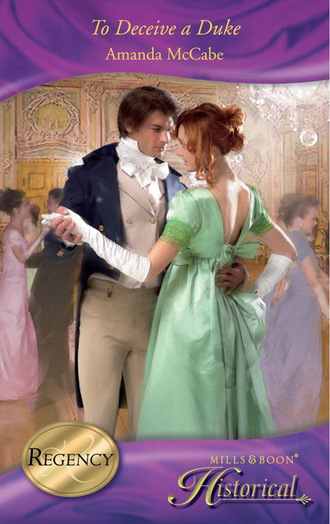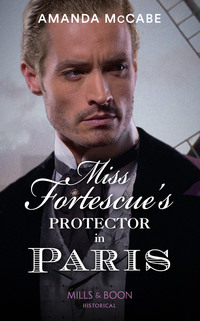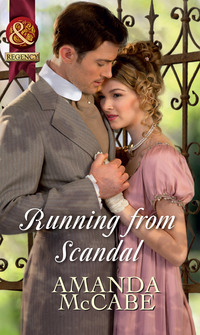
Полная версия
To Deceive a Duke
Demeter never disturbed Clio when she was there. Nor did Persephone and her dark husband. They seemed to know Clio was one of them, that she did their work to bring them back to life.
She passed the tree, giving it a respectful nod. There were fresh lemons piled in a basket in its shade. There was a wide road nearby, a way for horses to get to the village, but she ignored it. Along another path, barely marked in the clover, she hurried her steps until she found what she sought. Her own perfect place.
While her father worked on the villa, once the dwelling place of rich men, and Thalia revived Antigone in the theatre, Clio looked for less exalted remains. Her explorations had brought her here, to this quiet little meadow, where she had found her farmhouse.
She paused at the edge of the site, as she always did when she arrived, drinking in the peaceful, quiet vision. It was not the ancient holiday house of a wealthy family, as the villa was. The people here had been prosperous, but they also worked for their coin. Lived off the fruit of their labour and their land. Once, this clover-covered valley had been fields of wheat and barley, with fruit orchards and groves of olives.
Until it all came to an end, one violent day in the second century BC. Now there were just some waist-high walls of small, uneven pieces of tan-coloured limestone, weatherbeaten and crumbling, to mark where their house once stood. But Clio intended to find more. Much more.
She hurried to the walls, pulling out her stash of tools wrapped in oilcloth and tucked into a sheltered niche. The wooden handle of the small spade fit perfectly into her hand, as a soldier’s sword hilt would in battle. Maybe she did not belong in London, not really, but she did belong here. When she worked, she forgot the world outside. She even forgot Averton—for a time.
All the passion she had once poured into the Lily Thief was now given to her farmhouse. To finding the voices of the people who once lived here.
She went to work.
Chapter Two
‘Is it quite satisfactory, your Grace?’ the agent asked, his voice quivering slightly. ‘Truly, it is the finest palazzo to be had in all of Santa Lucia. The views are most exquisite, and it is quite near the cathedral and the village square. And there is a hunting cottage, too, in the hills, if you require it. The baroness is usually very reluctant to leave her furnishings for the tenants, but for you, of course, she is only too happy…’
Only too happy to have an English ducal arse touch her couches? Edward Radcliffe, the Duke of Averton, examined the flaking, worn gilt of the apricot velvet chairs with some amusement. They looked as if the slightest touch would reduce them to a pile of splinters and shredded upholstery. The baroque flourishes of the place, plaster cherubs peering down from the ceilings and faded apricot-coloured silk wallpaper, seemed no better. Chipped and crumbling away, like an abandoned wedding cake.
It could certainly use a thorough cleaning, as well, for the scuffed marble floor was covered with a fine layer of silvery dust. Cobwebs spun from the elaborate frames of old portraits, where the baroness’s exalted Sicilian forebears gazed down at him in disapproval.
Well, they were not the only ones who disapproved, to be sure. Old Italian barons and their long-nosed wives had nothing on one Englishwoman’s contempt-filled emerald eyes.
Edward turned away from them, away from that cool green gaze that haunted him everywhere he went. He leaned his palms on a chipped marble windowsill, peering down at the scene below. The baroness’s palazzo perched at the edge of the hilltop where the village of Santa Lucia gazed out over the valley. The tall, narrow windows, curtained in dusty gold satin and tarnished tassels, stared right at Etna in the distance, to Lake Pergusa and eventually even to the sea.
The palazzo’s small garden, wild and overgrown, seemed to drop off into sheer space. As if an eagle could launch itself into space and go wheeling out over the amphitheatre and into the mist beyond, right from this garden.
The front of the palazzo, on the other hand, sported a much more respectable-looking courtyard, paved and neatly planted with myrtle trees, with tall limestone walls and wrought-iron gates that opened to the narrow street beyond. Its cobblestone length was silent, and seemed rather little travelled, but it did lead right to the village square with its shops and cathedral, its view of the whole village and everyone in it.
Perfect.
‘Tell me,’ Edward said, not turning his gaze from the theatre, ‘where is the house the Chase family rents?’
‘The Chases?’ the agent said, sounding a bit confused. His mind was obviously slow to turn from views and furnishings to the other inhabitants of Santa Lucia. ‘Ah, yes, the family with the daughters! Their home is on the other side of the square, just beyond the cathedral. They are often seen on walks in the evenings.’
So, not far from here. Edward closed his eyes, and it was as if he felt her very presence beside him. The wilful Muse.
‘I will take the palazzo,’ he said, opening his eyes again to the dazzle of the Sicilian sunlight. ‘It is perfect.’
By the next morning, Edward’s battalions of servants had removed the baroness’s dour-painted ancestors and the worst of the gilt furniture and replaced them with choice selections of the Averton antiquities collection. Graceful red-figure amphorae rested on stands under the shocked stares of the plaster angels. A few marble statues took up places in the newly dusted corners, touches of austere elegance amid all the wedding-cake flourishes.
Edward’s own chamber overlooked the front courtyard and the street beyond. The largest bedroom, which was obviously the baroness’s own to judge from the bedhangings draped from a huge family coat-of-arms, looked upon the grand view of garden and hills. But he preferred this smaller space, where he could watch the town and passers-by.
He examined the arrangements as the servants deposited the last of his trunks and crates. Gilded mouldings carved in the shape of roses, wheat sheaves and arrows garlanded the windows and doors, matching the white-and-gold bed and armoire. The blue-and-red carpet was faded and threadbare, as were the coverlets and bedhangings of blue watered silk. It all lacked the medieval grandeur of his Yorkshire castle, the Gothicism of Acropolis House in London. But the mattress was aired, the room spacious enough—and he could see almost the entire town from the window.
Including the edge of the Chase house.
‘It will all do very well,’ he murmured, watching closely as the footmen carried in the last of the antiquities so carefully shipped from London. A statue of Artemis with her bow raised. The famous ‘Alabaster Goddess’. They placed her next to the fireplace, where she looked as if she was about to shoot down a row of simpering porcelain shepherds and shepherdesses on the mantel. Along her base, barely visible in the veined marble, was a scratch mark from a thief’s lever.
Edward traced it lightly with his fingertip, the tiny groove that was the only reminder of that night in the gallery of his London house. Artemis’s cool fierceness always reminded him of Clio. The goddess of the moon, of the hunt—she never let any mortal man stand in the way of what she wanted, what she believed to be right. She never shied away from any danger.
But Artemis was immortal, the favourite child of all-powerful Zeus, who would never let harm come to her. Clio, despite her daring, was all too human. One day her gallant recklessness would surely catch up with her, and she would tumble heedlessly into the danger. Foolish girl.
Edward turned away from Artemis and her bow, and found himself facing a full-length mirror. What a strange vision he was, framed in the gilt flourishes and ribbons of that rented glass! The shoulder-length fall of reddish-blond hair his valet so often hinted he should cut, for the sake of fashion, was tied back. As stark as his black wool coat and white cravat, skewered with a stickpin carved with a cameo head of Medusa. As stark as the sharp cheekbones and square jaw that was the legacy of all the Radcliffes, handed down from some distant Viking ancestor.
Yes, he looked like a true Radcliffe, the heir to the old dukedom, but he was flawed. His nose, thin and straight as a knife blade in the faces of his late father and older brother, was marred by a badly healed break across the bridge. The legacy of a boyish, long-ago brawl with the man who was now Clio’s brother-in-law.
And, a gift from the Muse herself, a jagged scar on his forehead. Healed to a white line now, it was the exact shape of Artemis’s stone elbow.
Edward laid his fingertips lightly on the mark, feeling its slight roughness. Feeling again the fire of her kiss.
Yet he did not let her go then. He could not. It was as if there was a devil inside him, a dark demon that dwelled there, hidden, from the time he was a boy. A part of him that desired Clio Chase no matter what she did—now matter what he did. But he could not let her stand in the way of his work in Santa Lucia.
Edward reached out and tilted the swinging mirror between its hinges until it faced the faded blue wallpaper, and he was hidden from himself. He took off his coat and tossed it over the foot of the bed, rolling up his shirtsleeves to reveal the glint of his ruby-and-emerald rings. His forearms were well muscled and sun-bronzed, the arms of a man who had been working on archeological sites under the southern sun for many of his years. The frilled sleeves hid those signs of un-ducal labour, just as the rings hid the white calluses at the base of his fingers.
It would never do for anyone to see what he was really up to. What the famously reclusive, famously louche ‘Duke of Avarice’ was truly like.
He unlocked the small, iron-bound box on the dressing table. Stacked in there were letters and papers, bags of coins, but beneath was a false bottom, which had stayed neatly in place ever since the box had left England. Edward levered it upwards and drew out two objects. A tiny silver bowl, Grecian to judge by its decorations, second century BC perhaps. It was exquisite, hammered with a pattern of acorns and beechnuts, etched with rough Greek letters spelling out ‘This belongs to the gods’. A warning, and a promise.
Beside it was a scrap of green-and-gold silk, torn along a seam, edged with sparkling green glass beads.
He laid them both carefully aside, the bowl and the silk. They were the symbols of all that brought him to this place. All that brought him again to Clio’s side—even as he fought against that desire.
But fate, it seemed, always had other plans when it came to him and Clio Chase.
Chapter Three
‘Ah, another invitation from Lady Riverton!’ Clio’s father announced over the breakfast table. He waved the embossed card in the air before depositing it with the rest of the post.
‘Again?’ Clio said, only half-listening as she buttered her toast. Her head was still full of the farmhouse, of her plans for the day. It looked as if it might rain, as it so often did here in the mornings. The sky outside the windows was ominously grey, and she had to cover up yesterday’s work before the house’s cellar filled up with water. ‘We were just at her palazzo last week. Weren’t we?’
‘But this is different,’ Sir Walter said. ‘An evening of amateur theatricals, it says. And her refreshments are usually quite good, you know. Those lobster tarts last time were lovely…’
Clio laughed. ‘Father, I vow you begin to think only of your stomach! But we can attend, if you like.’
‘Perhaps she would let me participate in the theatricals,’ Thalia said, pouring herself more chocolate. ‘I would like to try out some of my Antigone lines on an audience. I am not sure my delivery is quite correct. It all sounds very well in the amphitheatre, but then anything would be terribly dramatic there! I do want it to be right.’
‘Have you yet found anyone for the role of Haemon?’ Clio asked.
Thalia shook her head. ‘All the Sicilians speak so little English, and all the Englishmen lack passion! I don’t know what to do. Perform it all in Greek? Everyone seems to speak it around here.’
‘Lady Riverton will be able to help, I’m sure, Thalia dear,’ Sir Walter said. ‘She does appear to know absolutely everyone.’
‘And she’s a terrible busybody,’ Thalia answered. ‘I don’t want her taking over my play! But I will certainly call on her to ask about the theatricals. Will you come with me, Clio?’
Clio glanced again out the window, where the sky seemed even darker. She hurriedly gulped the last of her tea and said, ‘If you go this afternoon, I can come with you. But I must run an errand this morning. If you will excuse me, Father?’
Sir Walter nodded distractedly as he read another invitation. He was quite accustomed to Clio dashing away at all hours now, which was how she liked it. Even the time she had gone off with the Darbys to see the temple at Agrigento with only a day’s notice had not caused him to bat an eye.
As Clio hurried from the breakfast room, she heard her sister Cory say plaintively, ‘May I go to Lady Riverton’s, too? Please? I have been to no parties at all since we came here, and I am nearly fifteen.’
‘That is because until October you are still only fourteen,’ Thalia answered. ‘You are not out yet, and you should feel lucky for that. You have no social obligations at all, and can do what you please!’
Clio paused at the front door to change to her sturdy boots. If she ran, surely she could stay ahead of the rain and return in plenty of time to call on Lady Riverton. She dashed out the door and down the narrow lane that skirted past the cathedral and into the main square of Santa Lucia.
The village was just stirring to life for the day, fruit, vegetable and fish sellers setting up their booths, the bakery and patisserie opening their doors in a flood of sweet-sugar smells. Maids were fetching water from the fountain, gossiping and laughing. The great carved doors of the cathedral were still closed for morning mass, but soon they would open, letting out the prosperous matrons and pretty maidens of the town. The darkly dangerous-looking men were lounging in the shadows.
The day was still cool, but later the warm sun would bring out the smells of all this life, the salty fish and pungent herbs, the sweet cakes, the earthiness of the horses and dogs. The cathedral bells would ring out, crowds would flood forth to do their marketing, and the English tourists would dash away to view the ancient temples, and the day of Santa Lucia would begin in earnest. The wider politics of the world, King Ferdinand, the ruler of the Kingdom of Two Sicilies, far away in Naples with his young Sicilian bride, the collapse of the Sicilian feudal system after the withdrawal of the English forces—none of it mattered here. Not yet, not now. There was shopping and cooking to be done.
Marie, the baker’s wife, leaned from the window to hand her a fresh roll as she dashed by. ‘It will rain, signorina! You should stay inside this morning.’
Clio dashed past Lady Riverton’s grand palazzo. The windows were still shuttered, but when they were opened Lady Riverton could spy on all that happened in Santa Lucia—which was surely just as the youngish widow wanted it.
Clio never really minded attending gatherings there. They were certainly dull enough, to be sure, especially when she had studies of her own to attend to and was forced instead to make polite conversation or listen to some young, talentless miss play at the pianoforte. But most of Lady Riverton’s guests were also interested in antiquities, and the talk was usually lively. And, as her father had said, the food was quite good. If there was something rather odd about Lady Riverton, well, that was no different from dozens of other bored society matrons.
At the edge of town, also with a fine view of things and perched dramatically on the hillside, was the palazzo of the Baroness Picini. It had stood empty since the Chases had arrived at Santa Lucia, the baroness having taken herself off to Naples in the court of the new queen. Today, though, the vast old place was swarming with activity, servants hurrying in and out bearing trunks and crates and furniture. The courtyard gates stood wide open.
More guests for Lady Riverton, then, Clio thought. Despite her curiosity about who might dare to live in the mouldy old pile, she still had work to do, and turned down the steep pathway to the valley.
She reached the farmhouse site just as the first raindrops started to fall. The sunken cellar area where she had begun excavating, digging out clay amphorae and jars once used for oil and wine, smelled of the sweet, earthy rain, the sulphur of lightning and the imagined remnants of the old wine. Clio shook out a tarpaulin, dragging it up and over the cellar opening and tying it down to the limestone walls. She had done it several times before, so it was quick work.
It wasn’t much, but at least it would keep the rain from filling up her excavation trenches before she had finished. So far she had found only the storage jars, a terracotta altar set and one battered silver goblet, but she hoped to discover coins, jewelled goblets and crockery, perhaps even some jewellery. Something to show her father and his friends, so they would not think she had wasted her time on an insignificant site!
She secured the tarpaulin as the rain began to fall in earnest, a soft, warm shower that pattered against the oiled canvas. Clio sat down on another square of canvas spread out on the packed dirt of the cellar, hugging her knees to her chest as she listened to the rain above her head.
It was a strangely soothing sound, cosy as she sat in her ancient house, imagining the blessing of the water falling on the crops in the fields, the flowering orchards. Surely the people who once lived here had done the same thing, thanking Demeter, goddess of the earth and all growing things, for her bounty, making offerings in hopes of a good harvest.
Clio had always loved envisioning the lives of the past. She could hardly get away from history, not with her family! There was her grandfather, who had written a famous treatise, The Archeology of the Ancients; her father, who had so richly inherited those scholarly sensibilities and had used them to co-found the Antiquities Society; her mother, the daughter of a French comte renowned for his collection of Hellenistic silver; her sisters, all the Muses. They had been fed on tales of the old gods, old battles and love affairs, glories that would never die, from the time they were in their cradles.
The classical world was as real to Clio as the everyday life of the London streets and squares—no, it was more real. More vital and true. She always took those stories far more to heart than even her sisters did, and it led her into trouble time and again—until it had all come to a terrible crescendo with the Lily Thief.
Clio closed her eyes tightly as the rain pounded louder above her, trying to block out the memory of Calliope’s shocked eyes as she saw the truth—that Clio was the Lily Thief. ‘How could you do this, Clio?’
Clio never wanted to hurt her sister. She loved Cal so much, loved them all, her entire boisterous, noisy, eccentric family. But so often she felt alone, even when she stood in their midst. Even as the sound and passion broke all around her, just like the rain.
Things had changed since Cal had married and they had come to Sicily, though. Clio loved this island, loved its windswept whispers that seemed to speak only to her. She loved the roughness of the land and the people, the layers of history in the very earth itself. Just like this house, or what was left of it, where families had lived their daily lives, laughed together, made love, quarrelled and died, she felt herself slowly stirring back to warm, vivid life. She poured all her work, her secrets, into this place, and in return it gave her back herself.
Not that everything could be left behind, of course. At night, when she tumbled exhausted into bed, she had such dreams. Such vivid flashes of memory. The Duke of Averton, how his lips felt on hers, the cool brush of his breath on her skin, the heat and life of him, before she had driven him so violently away. The way he watched her, as if he could see into her very soul. See everything about her…
Thunder cracked overhead, loud as a cannon shot, and Clio reared back in surprise. She had almost forgotten where she was, lost in the haze of those memories. The dark gold-green of the duke’s eyes, drawing her ever closer, so close she could almost drown in him.
She peered up to find her tarpaulin still securely bound, though bowed in the centre by the weight of the rain. Surely it would cease soon; these morning showers always passed, the thirsty land soaking up every drop until there was no sign of rain at all. Even now she could hear the thunder retreating back along the valley.
Clio took out her small spade again and went to work on her newest excavation, near the remains of the old stone staircase that once led to the upper floors of the house. She would probably have more luck if she worked faster, Clio thought as she carefully measured out a trench in the pockmarked earth. Tear up the floor and be done with it, as anyone else would. As those deceptively lazy men in Santa Lucia would. But then she couldn’t come here alone, to her quiet sanctuary. Couldn’t lose herself in work and dreams.
She had barely started digging when she noticed something odd, something that hadn’t been there before. An indentation in the dirt, maybe. An old trench someone else had once dug. She pushed her spectacles atop her head, tangling them in her hair, and leaned in to peer closer…
Just then she heard a rumbling noise overhead, like the thunder except it persisted, growing ever louder. She froze, sitting back on her heels, tense, as she realised what it was.
Hoofbeats.
Her skin turned suddenly cold, the back of her neck prickling. The blood quickened in her veins, as it had not since she had left the Lily Thief behind for good. No one ever came out here; the old farm site was too isolated, too insignificant for tourists. She had been warned about bandits, of course, and thieves—Sicily could be a wild, dangerous place. But she had never seen any.
Was that about to change?
Clio carefully laid down the spade, and reached under her skirt for the sheath strapped to her leg just above the boot. In one smooth, silent movement, she drew out her dagger.
It was no dainty, ornamental little antique, but a well-honed, sturdy knife, forged to razor sharpness in the Santa Lucia smithy. Their Sicilian cook and her husband had given it to her when she kept insisting on wandering off by herself. At first they were utterly scandalised. Upper-class Sicilian girls were even more strictly chaperoned and protected than English girls! But when she had persisted, they had given her the dagger, certain that any lady as strangely independent as Clio would know how to use it.
Their kind confidence was not misplaced. Clio had once been the most famous thief in London. She could use a dagger if she had to. But she hoped she would not.
Surely the hoofbeats, which came ever closer, were only those of a traveller who would quickly pass by on the way to more elaborate sites. Still, she had to be careful. Clio silently crept up a few of the crumbling stone steps, poised on her toes, until she could ease back the corner of the tarpaulin and peer out on to the world.
The rain had finally ceased, leaving behind a damp, rich scent, a land that sparkled with waterdrops on flowers and treetops. The sky was still grey, but a few chalky sunbeams broke through. The horse was coming from behind the farmhouse, along the old, overgrown roadway.
Balancing the dagger hilt in one hand, Clio folded back the tarpaulin a bit more, until she could see past the canvas edge. ‘Blast it all,’ she muttered, wondering if she had fallen asleep on the dirt floor and was dreaming—or having a nightmare.











